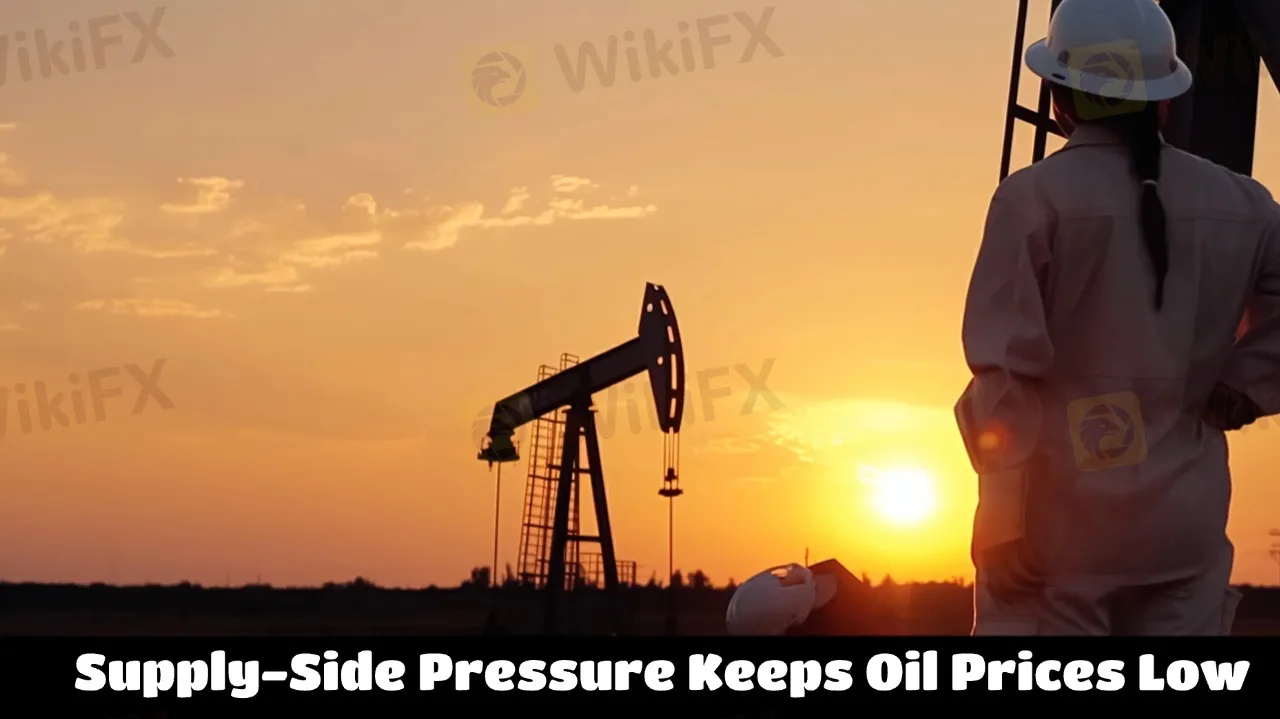简体中文
繁體中文
English
Pусский
日本語
ภาษาไทย
Tiếng Việt
Bahasa Indonesia
Español
हिन्दी
Filippiiniläinen
Français
Deutsch
Português
Türkçe
한국어
العربية
Supply-Side Pressure Keeps Oil Prices Low
Abstract:Oil prices are facing supply-side pressure, and their future trends remain highly uncertain, as geopolitical and economic factors intertwine to influence the market.

Recently, international oil prices have slightly declined, primarily due to Russia agreeing to temporarily stop attacking Ukraine's energy infrastructure. This ceasefire agreement has raised expectations of Russia's oil potentially returning to the market, thus exerting downward pressure on oil prices. Brent crude futures fell by 0.2%, settling at $70.44 per barrel, while U.S. WTI crude futures dropped by 0.2%, to $66.75 per barrel.
Since the outbreak of the Russia-Ukraine conflict, Russian oil exports have been restricted by sanctions, leading to a reduction in supply. With the ceasefire agreement, the market generally expects that if the situation further eases, sanctions could be relaxed, allowing Russian oil supply to increase, which would place downward pressure on oil prices. However, President Putin has only agreed to temporarily stop attacking Ukraine's energy infrastructure, and a comprehensive ceasefire agreement has not been reached, leaving the situation uncertain.
Furthermore, instability in the Middle East continues to affect oil prices. U.S. actions against Yemen's Houthi rebels, Israeli airstrikes on Gaza, and other conflicts have intensified concerns over potential disruptions to oil supply, which has limited the downward movement in oil prices.
Future Oil Price Outlook
In the short term, oil prices may fluctuate within a range, influenced by global economic conditions, geopolitical risks, and other factors. The market will closely monitor the progress of negotiations between Russia and Ukraine, as well as the situation in the Middle East, which may escalate further. If there are more significant supply disruptions, oil prices may rebound quickly.
In the medium to long term, oil prices will continue to face considerable uncertainty. The global economic outlook, changes in demand, and fluctuations in supply will keep influencing the market. Even if Russian oil supply increases, ongoing conflicts in the Middle East and uncertainties in the U.S. economy will continue to put pressure on oil prices. Investors must respond flexibly, stay alert to policy changes and market dynamics, and seize the right opportunities to buy or sell.

Disclaimer:
The views in this article only represent the author's personal views, and do not constitute investment advice on this platform. This platform does not guarantee the accuracy, completeness and timeliness of the information in the article, and will not be liable for any loss caused by the use of or reliance on the information in the article.
Read more

The Deepening Roots of Forex Scams in India
Check out how forex scams in India have expanded beyond banks and unregistered brokers to include the informal gang racket duping investors every day.

Important Statement on the Authenticity of WikiFX Score and Broker Reviews
WikiFX is committed to enhancing transparency and security in the forex industry through technological means and publicly available data. We firmly believe that fair information disclosure and a scientific evaluation system can genuinely safeguard investors’ rights and boost the healthy development of the industry.

Trade Nation vs. HYCM: Which Broker Should You Choose?
When it comes to online forex trading, picking the right broker can make a big difference. Two popular choices, Trade Nation and HYCM, that offer different features, rules, and trading conditions. Both are regulated by financial authorities, but they follow different approaches in areas like fees, trading tools, and customer support. This comparison helps traders understand which platform might suit their needs better.

How Money Moves the World | Why Finance Matters for Everyone
Finance is often perceived as a complex and technical field, filled with jargon and abstract concepts. Yet, behind its intricate systems lies a fundamental truth: finance touches every aspect of our lives.
WikiFX Broker
Latest News
How to Choose the Right VPS for Forex Trading
Still Falling for BotBro’s 60% Annual Forex Returns? Wake Up Before It Gets Too Late!
Webull Adds Crypto Trading Through Kalshi Partnership
Investment Scam Exposed: Deepfake Videos of Top Indian Leaders & Tech Icons misused to Lure Investor
Global Introducing Broker Growth Sharing Campaign
HYCM Flagged by Malaysia’s Securities Commission
AMarkets Review 2025: Read Before Trade
Markets4you Launches Global Giveaway to Celebrate 18th Anniversary
U.S. consumer prices rose 2.4% in May, below expectations
ASIC Flags New Threat: Unlicensed Finfluencers Targeting Aussie Youth Through Hype Culture
Currency Calculator


